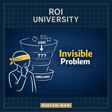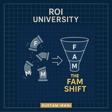Become a Creator today!Start creating today - Share your story with the world!
Start for free
00:00:00
00:00:01

When I Got Schooled
In this episode, Rustam Irani unpacks a leadership moment that blindsided him—a silent, frustrated team member and two words on a whiteboard that changed his entire approach to leading marketers. Through this story, Rustam breaks down how purpose, identity, and challenge drive performance, and why conversations always beat assumptions.
Resources Mentioned
- AdRoll — https://www.adroll.com
Timestamps
- 00:00–01:15 — The gut‑punch moment: Setting the stage with the harshest feedback Rustam ever received.
- 01:15–03:41 — The silent treatment: A team member withdraws, creating tension and confusion.
- 03:41–05:26 — Leadership crossroads: Choosing between ignoring the issue or addressing it head‑on.
- 05:26–07:32 — The whiteboard moment: "Analyst" vs. "Scientist" — identity becomes the root issue.
- 07:32–10:52 — Reframing the role: Rustam explores new challenges and hands over a high‑impact project involving DSP remarketing.
- 10:52–14:11 — Lessons learned: Purpose, identity, challenging work, and the power of real conversations.
- 14:11–16:25 — Final reflections: Encouragement for leaders to rethink how they engage team members and handle tension.
Transcript
Impact of Harsh Feedback on Leadership
00:00:01
Rustam Irani
Before we get into today's episode, let me ask you something. What's the harshest feedback you've ever received from someone on your team? Because mine came the form of two words written on a chalkboard in a one-on-one meeting by an employee who literally hadn't spoke to me in two days. those two words completely changed how I lead And honestly, they punched me in the gut.
Introduction to ROI University Podcast
00:00:33
Rustam Irani
Welcome back to ROI University, podcast for higher ed marketers who want to change the game and themselves. I'm Rostam Irani, your host, a recovering engineer and former higher ed CMO.
00:00:45
Rustam Irani
Now, let's talk about what happens when sometimes we get gut punched and even after many, many, many years of leadership,
00:00:57
Rustam Irani
We get put in situations that are very uncomfortable and test our leadership. Today's story starts with every leader really
Dealing with Unresponsive Employees
00:01:07
Rustam Irani
dreads, right? The silent treatment.
00:01:10
Rustam Irani
And I can tell you over the years, 25 plus years, I've been In the workforce, outside of my McDonald's experience and some of my other jobs I had, I have definitely had some very interesting experiences.
00:01:29
Rustam Irani
Let's just say sometimes cops were involved and you name it, I've had some incredible experiences. But this one stood out to me because this was somebody who worked for me that was extremely smart.
00:01:43
Rustam Irani
And they were an analyst on our marketing team. Now our marketing team was pretty sizable. So we had about 30, I think we had about 33, 34 folks on our marketing team.
00:01:56
Rustam Irani
And so we were grateful and, and blessed enough to have analysts on our marketing team. And so i had this one analyst on my team that was very smart, just really sharp,
00:02:11
Rustam Irani
did great work, was a fantastic analyst.
The Analyst's Pursuit of Meaningful Work
00:02:16
Rustam Irani
And, you know, I really, you know, appreciated him. And really enjoyed what he was, you know, providing for us. And I actually enjoyed working with him. I thought he was just absolutely amazing.
00:02:30
Rustam Irani
But There came a time when it might have been about a year into our relationship where he had reported into me where there were couple projects that had pushed over to him.
00:02:43
Rustam Irani
And he started to get a little bit cold with me and not talk to me as much. His email responses were short.
00:02:54
Rustam Irani
They were abrupt. And so this... the time frustrated because it's, Hey, like who, like, I'm giving him direction based on what projects we need to get done. And at the end of the day, he's on the team with us.
00:03:12
Rustam Irani
And I've never been a big fan of the B word, right? Boss, I don't like to use that word. I actually, this is just personal, but I cringe when I hear the word boss.
00:03:26
Rustam Irani
I just don't like it. I feel like... I am just like everybody else. We're all on the same team together. I've always felt that way. I still feel that way today as a CEO.
00:03:37
Rustam Irani
I don't see myself as a CEO. I'm really just a part of the team and we're all kind of in this together. So when this happened, I was confused. I didn't understand why all of a sudden this person was getting so cold.
00:03:53
Rustam Irani
Not only that, but they had, you know, for a couple or a few days, just been very usually say hi everybody, wouldn't say hi to me.
00:04:04
Rustam Irani
And it got really cold. So it was a really difficult situation. And so I said, Okay, what do I do here? Because you can easily just ignore a situation like that, right? Say, Hey,
00:04:17
Rustam Irani
I'm the boss. Like, here's what I'm saying. Here's what you need to do. Like, just get it done, right? That's the easy way out, which probably won't end very well for most situations.
00:04:29
Rustam Irani
But I said, you know what? Let me have a one-on-one. Let me schedule a one-on-one sooner than later. We usually did them every week or every two weeks. So I said, let's just do it. I think it was middle of the week. So I said, I sent him a meeting invite to do a one-on-one.
00:04:46
Rustam Irani
And so we met in our one on one. And there was one of these little conference rooms, we had tons of these conference rooms, but I remember this one in particular, there was one little table, there was a whiteboard, no windows, it was really for like, maybe three or four people was a smaller conference room.
00:05:03
Rustam Irani
And I sat down in this room with them. And I said, Okay, I said, hey, listen, I know something's up. You're not comfortable with our relationship. You're being cold with me in the emails. You're rejecting when I say hello to you. You're not replying. You used to reply.
00:05:26
Rustam Irani
Something is off. And I basically said, hey, and I don't know why, but I pulled a Jerry Maguire, And I said, help me help you. I know something's wrong here.
00:05:38
Rustam Irani
I know things aren't going well. We had a great relationship. It's not that way anymore. Please tell me what's going on How can I help you?
00:05:47
Rustam Irani
And the most interesting thing happened after that. He stood up. We were both sitting on the table. He stood up. He went to the whiteboard He pulled the marker up and he went up to the board and he wrote analysts on one side of the board in big letters.
00:06:09
Rustam Irani
And then he wrote scientists on the other side of the board in big letters. And that was it. And then he looked at me and this was kind of surreal because literally it happened this way. And I was looking at him like, okay, what's going on here?
00:06:25
Rustam Irani
And he goes, Rustom, all of this work that you keep giving me all these projects that you keep giving me, you know, they're basically just data crunching.
00:06:37
Rustam Irani
There's just, you know, this, the, the, I'm getting kind of bored of these projects. I'm basically taking this data and I'm organizing it and putting it into these charts. And, you know, that's what,
00:06:52
Rustam Irani
maybe an analyst or a reporting person does. But I see myself as more than that. And I'm not being challenged as more than that.
00:07:02
Rustam Irani
I see myself more as a scientist, where I can take this data, but I want to do more with the data. he said, OK, tell me about that.
00:07:12
Rustam Irani
And he said, I want to create hypothesis from the data. I want to come to you and say, this is what I think this data is going to show us and why. And I want to be able to prove it.
00:07:23
Rustam Irani
Not only that, I want to give you two or three reasons why this data may or may not work or may or may not tell us what it needs to tell us. And I said, okay.
00:07:37
Rustam Irani
And so he went down this whole path of how He was a scientist. He saw himself as a scientist. And I wasn't challenging him that way. I was not recognizing that that was one of his strengths. Yes, he was pulling great reports together, but I was not giving him the opportunity to really do more of what he enjoyed and his skill set.
00:08:01
Rustam Irani
That was incredible eye-opener for me. I had never seen that before or had an analyst report mentioned that before. And I said, you know what?
00:08:13
Rustam Irani
I said, I appreciate that. Thank you for having this conversation with me.
Aligning Projects with Employee Interests
00:08:18
Rustam Irani
And I said, you know, I'm grateful that you're telling me these things. There's definitely more we could be doing.
00:08:25
Rustam Irani
And there's absolutely ways that we can be doing more scientific, you know, things with the data. And I said, Okay, I'll tell you what,
00:08:35
Rustam Irani
I said, what would be most challenging for you right now? He goes, well, you know, I'd like to do something different. I'd like to have something little, you know, a little different, a different type of project.
00:08:46
Rustam Irani
And I started thinking, and there was a project at that time. We were looking, this was don't know how many years ago, but quite a few years ago. But we were looking at doing some remarketing through DSPs, right? So display remarketing.
00:09:03
Rustam Irani
And so I said, hey, I said, we've got this project we've been talking about with AdRoll and running some AdRoll campaigns for remarketing. And I said, okay, how about this?
00:09:15
Rustam Irani
How about we give you this as a project where you take it on You do the research behind it. Bring out a hypothesis of what you think this is going to do for our business and our school and come back and let me know what type of budget you need.
00:09:32
Rustam Irani
i have up to x amount that I can do for this. I always had R&D budget that I tried to keep separate. Now it varied depending on months and projects and so on, but I always tried to have that.
00:09:46
Rustam Irani
And I said, come back, bring all that to the table, and we'll test it. If your hypothesis gives us an opportunity test it that it could be positive, we'll test it, and we can review the results and we can share it internally. Not only that, but I will highlight it in the next executive meeting for something that we tested. And so that
00:10:13
Rustam Irani
was huge. That one on one, that conversation flipped the entire switch on our relationship.
Lessons on Leadership and Engagement
00:10:23
Rustam Irani
By just taking the time and listening and understanding the other person's side of the story, right? There are a couple lessons that I've learned from that, right?
00:10:35
Rustam Irani
People want purpose. They know what reports are about, they know how to write campaigns and so on. But They want purpose. They want to pursue something that gives them a purpose that gives them the ability to do something a little bit different. Right.
00:10:52
Rustam Irani
And so that motivated him. And when you can find that purpose and you can bring that to the table, it's very, very helpful. Right. The other lesson I learned is people really care how they see themselves. What part of a role do they see themselves? Labels sometimes matter.
00:11:12
Rustam Irani
I can't tell you the number of times I had conversations about a junior analyst versus an analyst or a marketing specialist versus a marketing coordinator versus a marketing strategist.
00:11:24
Rustam Irani
Like every one of those words was something different, mattered a little bit more to some people versus others, right? And so a lot of times, like, At the end of the day, how people see themselves really matters, and it matters to them.
00:11:38
Rustam Irani
And so make sure you are considering that and you're giving them an opportunity to see themselves in the most appropriate way that gives them the feeling that they are doing and being a part of something bigger and doing the best work they can for that.
00:12:00
Rustam Irani
a third lesson that I learned was, you know, you've got to challenge people, you know, give them problems worth solving, you know, take them out of their comfort zone. And, you know, some people may not want that. And that's okay. But that doesn't mean you shouldn't still do that.
00:12:16
Rustam Irani
You know, let me find things that will push their boundaries and what they're doing. If they're campaign manager, you know, and maybe you don't have the budget to run certain types of campaigns, you can still have them come up with a scenario where if we ran this type of campaign, what would that do?
00:12:37
Rustam Irani
Right? Or, like i did as create, like, try to shave off some parts of your budget, so you can really test some things and get people doing some bigger problems, right?
00:12:50
Rustam Irani
I also, a lot of times what I did was I brought admissions or operational or finance related problems and challenges to our marketing team and said, let's help this other department solve these things. Like here's a big problem. What do you think we could do about it?
00:13:09
Rustam Irani
Speed to lead, how quickly we get in touch with leads that come into our contact center or our admissions team. Can we impact that? Right? So those are challenges that there's so many problems and challenges that we can work on.
00:13:24
Rustam Irani
Think about those and get them and challenge them on that.
The Value of Direct Conversations
00:13:27
Rustam Irani
you know, and look, I think the other big lesson is like conversations beat assumptions any day, right?
00:13:38
Rustam Irani
When you think certain people are feeling a certain way and you're not having that conversation, You may feel like you know what's going on, but you really don't unless you're having an opportunity to have a face-to-face.
00:13:53
Rustam Irani
I know now with remote work, it's more of a Zoom, but still having that face-to-face is just critical. And a lot of times... you will be amazed at what is most important or what is creating that friction or that challenge.
00:14:11
Rustam Irani
Well, you may have thought it was completely something. I thought I said something to that upset him. It had nothing to do with that. Right? So conversations always beat assumptions.
00:14:23
Rustam Irani
And at the end of the day, you've got to know the why. Know why they enjoy what they're doing. Know why they're continuing to be a part of the team and what they're looking for in the future. What that growth pattern looks like. And continue to check in on that. I think that's going to be huge and impactful for you as a leader and then also
00:14:48
Rustam Irani
your team members.
00:14:51
Rustam Irani
have you ever had a moment like this, An uncomfortable moment with a team member. It could even be a colleague.
Inviting Listener Participation
00:15:00
Rustam Irani
Maybe even a conversation that changed how you lead.
00:15:05
Rustam Irani
love to hear your story. DM me, message me on LinkedIn, connect with me on LinkedIn, and I'd love to learn from each other.
00:15:14
Rustam Irani
Thanks for listening to ROI University, where the biggest opportunity is usually yourself.












![Ep. 23 - Getting Promoted [2026]: Show Proof of Value image](https://media.zencastr.com/cdn-cgi/image/width=112,quality=85/image-files/630c9f06819f8b3dba5fa460/90d98cfc-639d-40ba-836c-1da926a16604.png)






